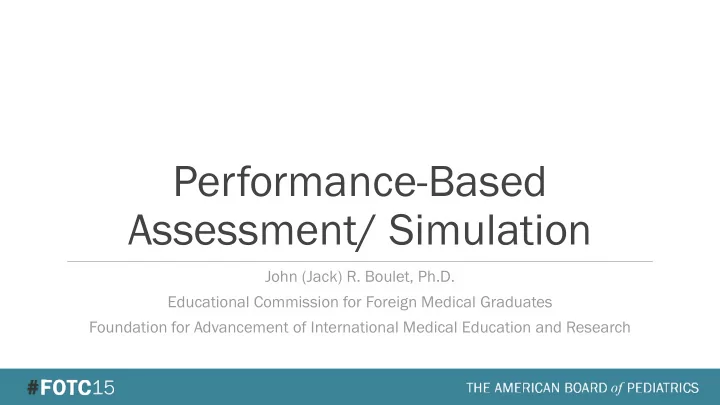

Performance-Based Assessment/ Simulation John (Jack) R. Boulet, Ph.D. Educational Commission for Foreign Medical Graduates Foundation for Advancement of International Medical Education and Research
Performance-Based Assessment/ Simulation • overview of where simulations can be used to assess (and educate) health professionals • outline promises and challenges • Development • Types of simulation • Research/ Psychometrics
Performance-Based Assessment/ Simulation What at is is Sim imul ulatio ion? A “technique” NOT a “technology” • For interactive and often “immersive” activities that re- create experiences of a real-world environment • To amplify or replace actual experiences Simulation is very broad
Performance-Based Assessment/ Simulation Approxim ximatio ions ns of of act actual sit ituat uatio ions can can help ind indiv ividu iduals de deal al w wit ith real w wor orld t d tasks
Performance-Based Assessment/ Simulation Why is Simulatio ion Important? ? • Assessment drives learning • Can be efficient • large numbers of ‘examinees’ • Provides clinical exposure • Clinical skills assessment • Practice-based learning • Tailored feedback • Quickly identify curricular problems • Patient safety
Performance-Based Assessment/ Simulation Ultim imat ate Go e Goal al • Improved patient outcomes linked directly to educational events (e.g., simulation-based training) are the ultimate goal of medical education research… McGaghie WC, Issenberg SB, Cohen ER, et al. Does simulation-based medical education with deliberate practice yield better results than traditional clinical education? A meta-analytical comparative review of the evidence. Academic Medicine 2011; 86: 706-711.
Performance-Based Assessment/ Simulation • United States Medical Licensing Examination (USMLE™) • Step 2 CS (ECFMG Clinical Skills Assessment) • Step 3 • National Board of Osteopathic Medical Examiners • Medical Council of Canada • General Medical Council (UK) • Professional Linguistics and Assessment Board • Various specialty board examinations • American Board of Emergency Medicine • American Board of Internal Medicine • American Board of Anesthesiology • Royal College of Physicians and Surgeons of Canada
Performance-Based Assessment/ Simulation Assessmen ent C Challenges • Measurement Issues • Validity, reliability • Scoring • Competency standards • Cost • Logistics/ feasibility • Competencies to measure? • Integration
Performance-Based Assessment/ Simulation Futu ture D e Directi tions • Assessment of knowledge, skills and abilities • Teamwork • Use of advanced technology to increase fidelity • Virtual reality • Haptic systems • Electronic portfolios • Combining simulation modalities • Advanced scoring systems • Patient outcomes • Additional validation studies
Performance-Based Assessment/ Simulation Thi hings t s to o Thi hink A Abou bout • Validity of simulation-based assessment? • Outcome measures • New assessments • Timing of assessments • Individual versus team • Cost/benefit of regulatory or accreditation processes that employ simulations? • Value to the profession/society
Recommend
More recommend